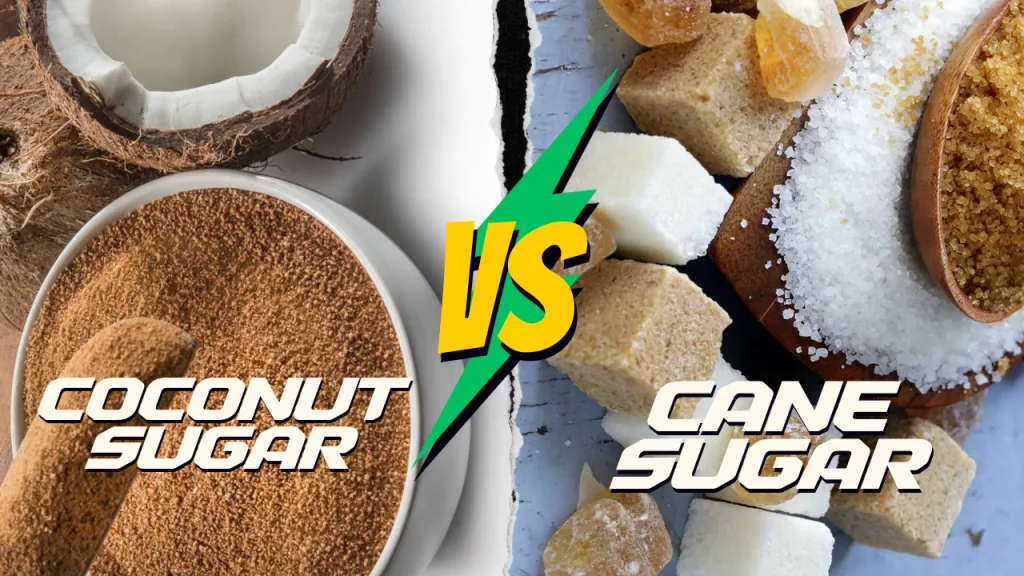The Sweet Debate: Coconut Sugar vs. Cane Sugar Nutritional Insights
Sugar, a staple in many diets, comes in various forms. Two of the most discussed are coconut sugar and cane sugar. Both have their unique characteristics, nutritional content, and benefits. Let’s dissect these two sweeteners to provide a clearer picture.
Nutritional Content Comparison
| Nutrient | Coconut Sugar | Cane Sugar |
|---|---|---|
| Origin | Coconut Palm Tree Sap | Sugarcane Plant |
| Calories | Similar to cane sugar | Predominantly “empty” calories |
| Minerals | Potassium, magnesium, zinc, iron | Mostly stripped during refining |
| Glycemic Index | Lower (slower glucose absorption) | Higher (rapid glucose spikes) |
| Fiber | Contains inulin | Lacks significant fiber |
| Antioxidants | Present in trace amounts | Minimal to none |
Nutritional Content
Coconut Sugar
- Derived from the sap of the coconut palm tree.
- Contains trace amounts of minerals such as potassium, magnesium, zinc, and iron.
- Also has short-chain fatty acids, antioxidants, and a fiber called inulin, which may slow glucose absorption.
- Has a lower glycemic index than cane sugar, meaning it might raise blood sugar levels more slowly.
Cane Sugar
- Extracted from the sugarcane plant.
- Primarily composed of sucrose.
- Undergoes a refining process that strips away most of its nutrients, making it a source of “empty” calories.
Pros and Cons
Coconut Sugar:
Pros:
- Lower glycemic index compared to cane sugar.
- Contains small amounts of nutrients and antioxidants.
- The presence of inulin might have digestive benefits.
Cons:
- More expensive than cane sugar.
- Not a significant source of nutrients, despite having more than cane sugar.
- Still a source of calories and should be used in moderation.
Cane Sugar:
Pros:
- Readily available and affordable.
- Neutral sweet flavor, making it versatile in cooking and baking.
Cons:
- Higher glycemic index, leading to rapid spikes in blood sugar.
- Lacks significant nutritional content due to the refining process.
- Overconsumption is linked to various health issues, including weight gain and tooth decay.
Culinary Uses: Coconut Sugar & Cane Sugar
Coconut Sugar:
- Baking: Can substitute regular sugar in a 1:1 ratio. Gives baked goods a richer, caramel-like flavor.
- Beverages: Adds a subtle depth to teas, coffees, and other beverages.
- Sauces & Marinades: Imparts a distinct sweet flavor to sauces, especially in Asian cuisines.
Cane Sugar:
- Baking: A standard sweetener for cakes, cookies, and pastries.
- Preserves: Essential in making jams, jellies, and preserves due to its preserving properties.
- Desserts: Universal in desserts from puddings to candies.
A Spoonful of Discovery: My Journey with Sugars
It all began on a breezy summer evening when I was baking my grandmother’s famous chocolate chip cookies. The recipe card, worn out from years of use, called for two cups of cane sugar. As I reached into the pantry, my hand brushed against a bag of coconut sugar I had recently purchased, driven by curiosity after reading an article about its benefits.
On a whim, I decided to use the coconut sugar instead of the traditional cane sugar. The results were astounding. The cookies had a richer, almost caramel-like flavor. Intrigued, I started researching more about coconut sugar and its differences from cane sugar.
The more I read, the more I was captivated. The lower glycemic index of coconut sugar meant it had a gentler impact on my blood sugar levels. While I was no nutritionist, the potential benefits seemed promising. I decided to experiment further.
Over the next few months, I began incorporating coconut sugar into my daily life. From my morning coffee to the sauces I cooked for dinner, the subtle depth of flavor it added was delightful. Not only that, but I also noticed fewer energy crashes in the afternoons, something I often faced after indulging in sugary treats.
However, I didn’t entirely shun cane sugar. Its versatility, especially in certain desserts and preserves, was undeniable. But the balance had shifted. Whereas cane sugar had once dominated my pantry and recipes, now coconut sugar stood proudly beside it, each having its unique place.
Friends and family began to notice the change too. Not just in the flavors of the dishes I served, but in my energy levels and overall vitality. Inspired by my journey, many started exploring the world of sugars, leading to fascinating discussions during our dinner parties.
The real revelation of this journey wasn’t just about which sugar was superior. It was about being open to change, willing to experiment, and understanding the impact of our choices on our well-being.
Today, as I sip my tea sweetened with coconut sugar, I reflect on this sweet journey of discovery. It’s not just about the sugars; it’s about the stories they weave and the lives they touch. And in this story, they made my life just a little bit sweeter.
Conclusion
Both coconut sugar and cane sugar bring unique flavors and characteristics to the table. While coconut sugar offers a tad more nutritional content, it’s essential to use sugars in moderation, regardless of type. Cane sugar, with its versatility, remains a staple in many kitchens.

